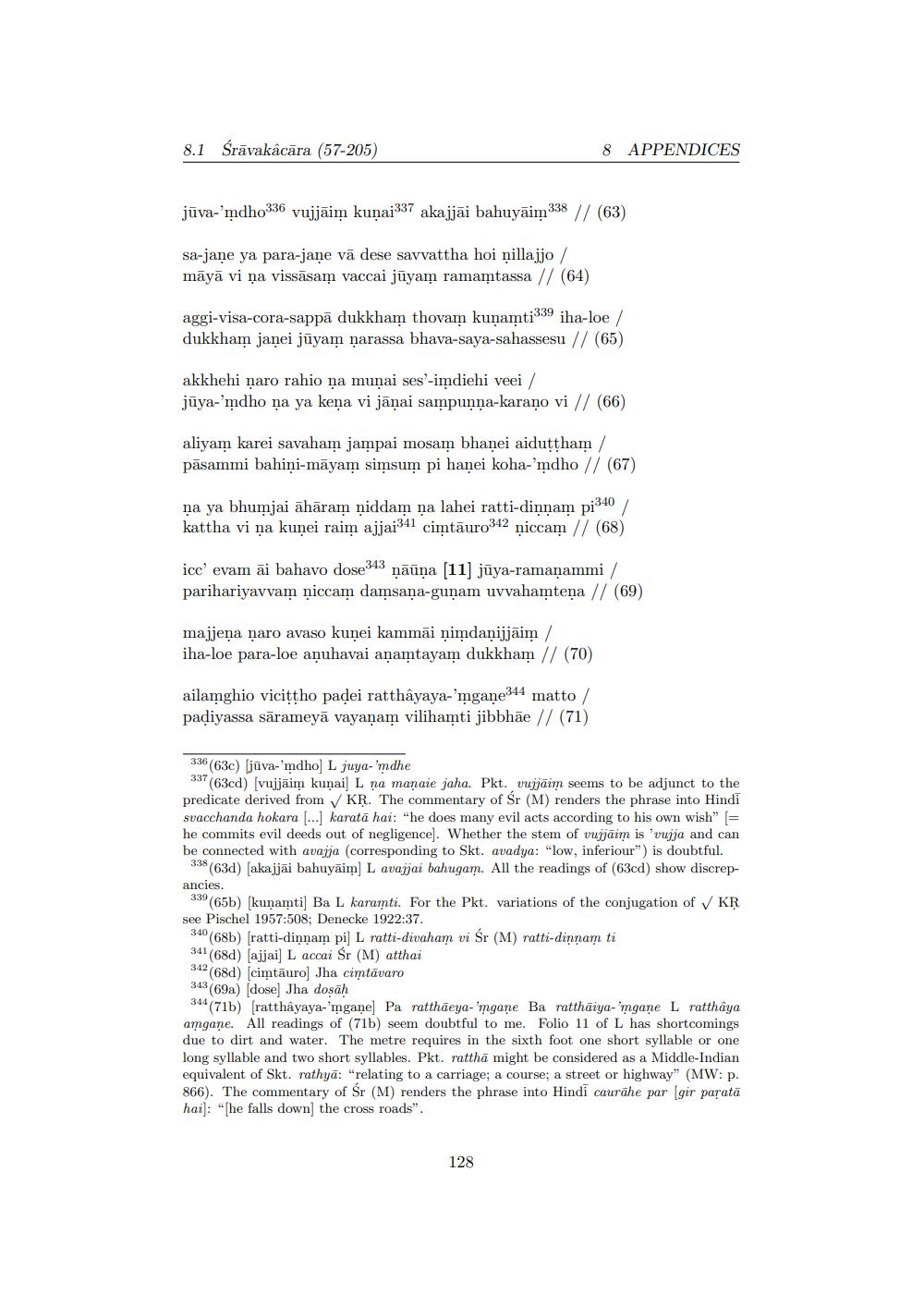________________
8.1 Sravakâcāra (57-205)
8 APPENDICES
jūva-mdho336 vujjāim kuņai337 akajjāi bahuyāim338 // (63)
sa-jane ya para-jane vā dese savvattha hoi nillajjo / māyā vi ņa vissāsam vaccai jūyam ramamtassa // (64)
aggi-visa-cora-sappā dukkham thovam kuņamti339 iha-loe/ dukkham janei jūyam narassa bhava-saya-sahassesu // (65)
akkhehi naro rahio na munai ses-imdiehi veei / jūya-'mdho na ya keņa vi jāņai sampunna-karaṇo vi // (66)
aliyam karei savaham jampai mosam bhanei aiduttham / pāsammi bahiņi-māyam simsum pi hanei koha-'mdho // (67)
na ya bhumjai ahāram niddam na lahei ratti-dinnam pi340/ kattha vi na kunei raim ajjai341 cimtāuro342 ņiccam // (68)
icc' evam āi bahavo dose343 ņāūņa (11) jūya-ramanammi / parihariyavvam niccam damsaņa-guņam uvvahamteņa // (69)
majjena naro avaso kuņei kammāi nimdanijjāim / iha-loe para-loe anuhavai anamtayam dukkham // (70)
ailamghio vicittho padei ratthấyaya-'mgaņe344 matto/ padiyassa sārameyā vayanam vilihamti jibbhāe // (71)
336 (63) jūva-'mdho] L juya-'mdhe 337 63cd) (vujjāim kuņai) L na manaie jaha. Pkt. vujjāim seems to be adjunct to the predicate derived from KR. The commentary of Sr (M) renders the phrase into Hindi svacchanda hokara [...] karata hai: "he does many evil acts according to his own wish" = he commits evil deeds out of negligence). Whether the stem of vujjaim is 'vujja and can be connected with avajja (corresponding to Skt. avadya: "low, inferiour") is doubtful.
338 (63d) (akajjāi bahuyāim L avajjai bahugam. All the readings of (63cd) show discrepancies.
339 (65b) [kuņamti] Ba L karamti. For the Pkt. variations of the conjugation of KR see Pischel 1957:508; Denecke 1922:37. 340 (68b) ratti-dinnam pi] L ratti-divaham vi Śr (M) ratti-dinnam ti 341 (68d) (ajjai) L accai Śr (M) atthai 312 (680) (cimtāuro Jha cimtāvaro 343 (699) (dose) Jha dosah 344 (71b) ratthâyaya-'mgane) Pa ratthāeya-'mgane Ba ratthāiya-'mgane L ratthaya amgane. All readings of (71b) seem doubtful to me. Folio 11 of L has shortcomings due to dirt and water. The metre requires in the sixth foot one short syllable or one long syllable and two short syllables. Pkt. ratthā might be considered as a Middle-Indian equivalent of Skt. rathyā: "relating to a carriage; a course; a street or highway" (MW: p. 866). The commentary of Sr (M) renders the phrase into Hindi caurāhe par gir paratā hai): "he falls down the cross roads".
128




